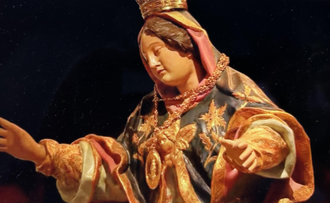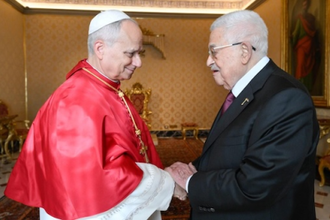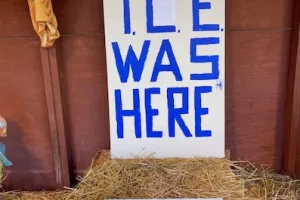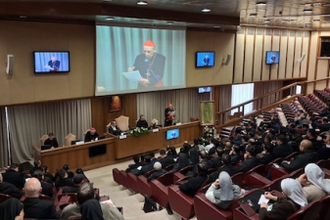Pope Francis visits Corsica

Screenshot
Source: Vatican Media
Pope Francis visited Corsica yesterday on his 47th Apostolic Journey abroad. This was the first first time a Pope has visited the French island.
In the early morning, shortly before leaving, accompanied by Cardinal Konrad Krajewski, the papal almoner, the Holy Father met with a group of around ten homeless people who sleep under the colonnades of St Peter's Square.
The Papal plane arrived at Ajaccio airport on a beautiful sunny morning. The day before there had been a storm and rain.
Pope Francis began his visit to the birthplace of Napoleon Bonaparte with prayers in front of a recently discovered Christian baptistery which dates back to the beginning of the 6th century.
He then attended the 'Conference on Popular Piety in the Mediterranean' at the Palais des Congrès et d'Exposition. In his address Pope Francis said that far from being an obsolete folkloristic expression, popular piety can be a powerful means for evangelization today, fostering community and belonging. He said the "active evangelizing power" of these expressions of faith should not be underestimated in our secularized societies, and called for a constructive dialogue between Christian and secular cultures.
Pope Francis warned against setting "Christian culture and secular culture" against each other. Rather, it is a matter of recognizing the possible "mutual openness between these two horizons: believers are increasingly open to the possibility of living their faith without imposing it on others," while "non-believers or people who have distanced themselves from religious practice are not strangers to the search for truth, justice and solidarity."
For the second event of the Pope's visit, Corsica's bishops, priests, deacons, religious and seminarians gathered in Corsica's Cathedral of Our Lady of the Assumption to join Pope Francis for the Angelus.
Before the prayer Pope Francis said: "From this island of the Mediterranean, we raise a plea for peace: peace for all the lands that face this sea, especially for the Holy Land where Mary gave birth to Jesus."
Recognising the struggle of spreading the Gospel today in Europe, where resources are few, numbers are small and society is often indifferent, the Pope described this 'poverty' as a blessing as "it strips us of the pretence that we succeed by our own efforts". In this way, he reminded all those present that it is not about "me" but about God. This humility, he stressed, keeps the focus on Christ, who works through what we offer.
He then urged each person present to ask themselves: How am I living my priesthood, my consecration, my life as a disciple?
The Pope then went on to invite those gathered to focus on two types of care: care for oneself and care for others.
In reminding people to care for themselves, Pope Francis described the religious vocation as not being a one-time "yes" but rather a daily renewal. "There is no living off the Lord," he warned and emphasised the need for eucharistic celebration and for moments of silence. He also spoke of the importance of balancing life well, so as not to burn out.
You need time for rest, dialogue, and even personal interests, he said, adding that fraternity, too, is vital.
Speaking then of the people they serve, Pope Francis quoted St Paul, who said: "I will most gladly spend and be spent for you". Evangelisation, the Pope noted, requires faith, creativity, and courage to reassess old methods and embrace new ways to meet people where they are. But above all, he added, it is about encounter - bringing Christ's hope to the suffering, the lost and all those who yearn for meaning. This means embracing compassion and forgiveness, particularly in the sacrament of reconciliation.
Speaking of forgiveness the Pope urged, "Please, forgive always. Forgive everything and always." He recalled the words of a wise cardinal who advised priests never to ask too many questions, urging them to, "if someone stammers in shame, say: 'Fine, I've understood. Let's move on.'" Always forgive!, the Pope repeated, noting that forgiveness reflects God's own heart.
"In 55 years as a priest, I have never denied absolution. I love confessing. I have always sought to forgive", he said.
Bringing his address to a close, Pope Francis invoked the Virgin Mary's or "Madunnuccia" as she is known in the region, before leading the congregation in the recitation of the Angelus.
The final public event of the Pope's visit was Holy Mass in Ajaccio's Place d'Austerlitz.
Drawing from the words of John the Baptist, who proclaimed the coming of the Messiah, the Holy Father invited all present to embrace the message of spiritual renewal and conversion.
In this season of Advent and reflecting on the question posed by the crowd to John the Baptist, "What then should we do?", Pope Francis noted that they remind us to reflect on our actions and attitudes in preparation for the Lord's arrival. The Pope noted that this question did not arise from those who were seen as righteous, such as the Pharisees and scholars of the law, but rather from those who were often considered "outsiders" such as tax collectors and soldiers. These people, who were tormented by their pasts filled with dishonesty and violence sought to change their ways. They were, in fact, ready to receive the call to transformation.
Pope Francis said the Gospel message does precisely this: stirs the conscience of the most vulnerable, including the poor and the outcasts, drawn to Christ to be saved rather than condemned. He noted that in today's world, just as in the past, the call to conversion is always open to all, regardless of past failings. The question "What then should we do?" is one we are all invited to ask ourselves this Advent season, said the Pope, noting that it calls us to prepare with humble hearts for Christ's coming.
The Pope went on to highlight two very different ways of waiting for the Messiah. The first, with suspicion, and the second with joyful expectation. Speaking first of suspicion, which the Pope described as being rooted in anxiety, distrust and a focus on worldly concerns, he said, prevents us from experiencing joy. The more we focus on ourselves, he said, the more we lose sight of God's providence. The remedy to this attitude, Pope Francis emphasised, lies in faith and prayer.
The Pope encouraged the faithful to embrace a joyful expectation of the Lord's coming. Christian joy, he explained, "is neither shallow nor ephemeral". On the contrary, it is a joy rooted in the heart and built on a solid foundation. He recalled the words of the prophet Zephaniah, who called his people to rejoice because the Lord was in their midst, bringing victory and salvation. "The Lord's coming brings us salvation: that is the reason for our joy", he said. This joy, the Pope explained, is not about forgetting life's hardships but rather finding strength and peace in the presence of God.
Bringing his homily to a close, Pope Francis acknowledged the great work of the local community of Ajaccio and in particular the Confraternities, whose charitable actions and devotion enrich the Church's life. He urged the faithful to continue serving the needy, embodying the joyful spirit of Christ in their works of mercy.
As the Advent season progresses, Pope Francis urged the faithful to cultivate peace and hope, particularly for young people preparing for Baptism and the sacraments. He reminded them that joy is the "style" of the Church's proclamation, bringing the light of Christ into a world that so desperately needs it.
In frequent off-the-cuff remarks, the Pope invited the faithful to always look after the elderly, who carry the wisdom of the people. Commenting on the number of children present, he also asked for particular care for the young, noting the many young people suffering from wars across the world, and in particular the children of Ukraine whom, the Pope says, "have forgotten how to smile."
In closing, the Holy Father addressed the challenges facing today's world. "There are many reasons for sorrow and despair in today's world", he said, listing "extreme poverty, wars, corruption and violence". Nevertheless, he continued, the word of God never fails to encourage us. Despite the suffering, "the Church proclaims an unshakable hope that does not disappoint", for the Lord is near, and in His presence, we find the strength to work for peace and justice. Joy in Christ, the Pope concluded, remains the source of our joy "in every time and amid every affliction."
Before leaving the island, Pope Francis and French President Emmanuel Macron met for around 30 minutes at Ajaccio's Napoléon-Bonaparte airport. They discussed "the international issues they share," according to the Elysée Palace.
On the return flight to Rome, there wasn't time for the usual press conference with the 67 journalists and photographers on board. But Pope Francis thanked them for their work and particularly mentioned how happy he had been to see so many parents with children in Ajaccio. They then presented him with a surprise cake to celebrate his 88th birthday which takes place on Tuesday 17 December.
The cake, made by a Roman bakery, had three tiers, with the white and yellow colours of the Vatican flag, bearing the inscription "Happy Birthday Pope Francis," with a figurine of the Pope sitting and giving a thumbs-up on top, and the words "Best Wishes!" underneath.
It was presented to the Pope amidst a chorus of "Happy Birthday..." by Mexican journalist Valentina Alazraki, the dean of Vatican journalists, long-time correspondent for Televisa Univision, and newly elected president of Aigav, who has accompanied the Pope on 161 trips.
"Thank you so much for your work," the Pope said. "Thank you so much for this. See you on the next trip!" "Where?" asked the journalists from their seats. "I don't know!" the Pope replied with a smile.


















